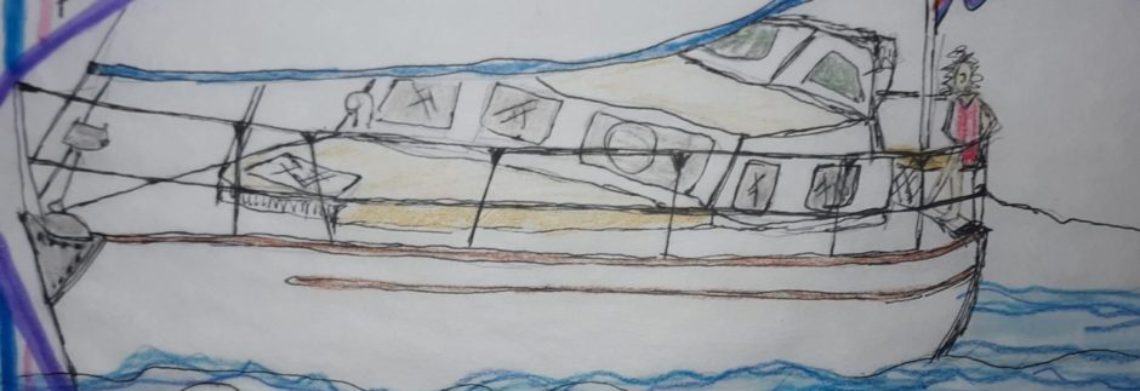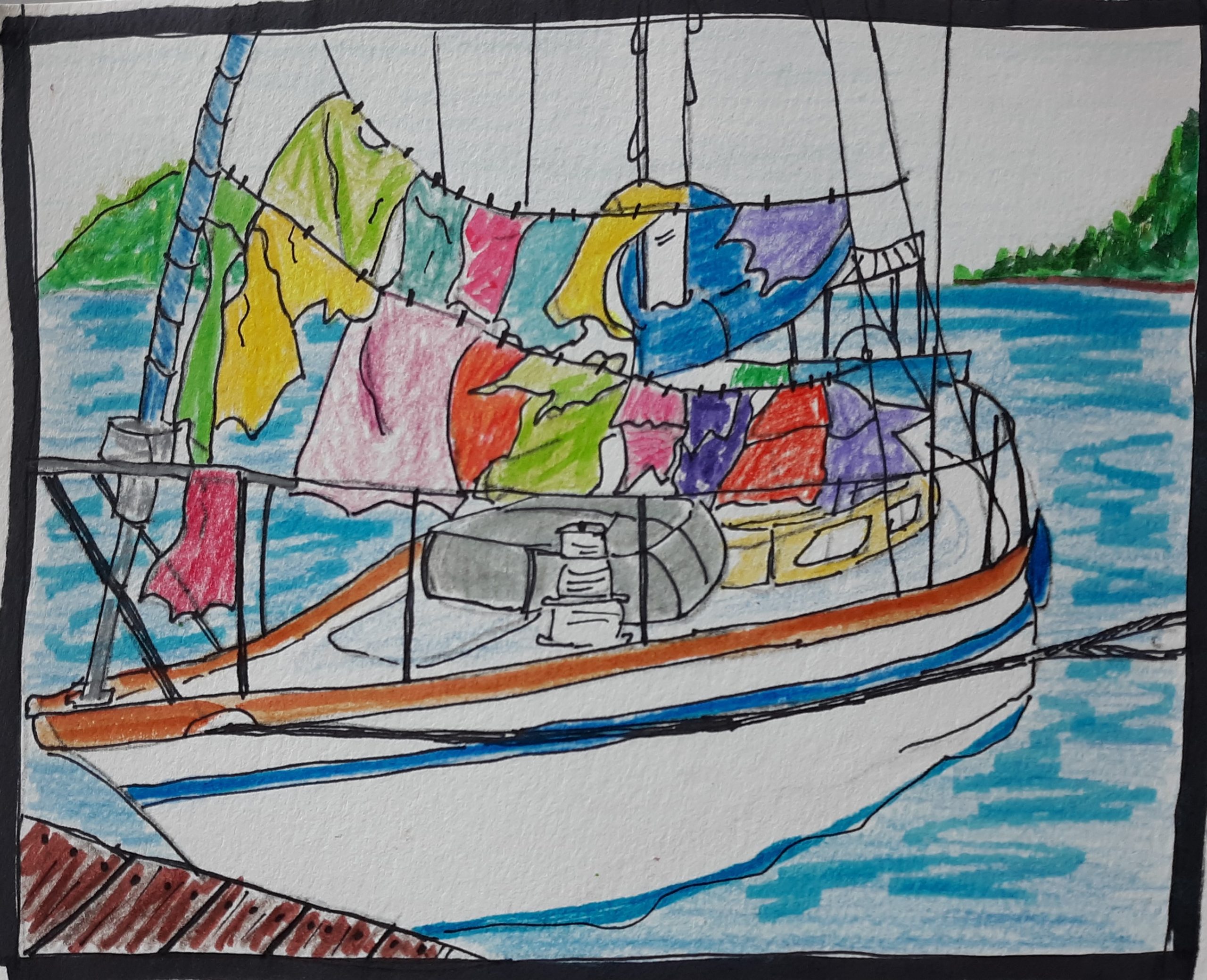- Date: May 2, 1987
- Location: Samarai, Miline Bay, PNG
- Subject: Clearing customs at Samarai, Papua New Guinea
Dear WaterFairy:
Today was a much easier day compared to the last few days. I loved today because I felt like it’s the first day of our adventure. I want to forget about the crossing, but Capt and Mom said I should be proud of what I went through and to think about how much I learned. I did learn a lot of stuff about sailing but today I say: I learned that I don’t want to do that type of crossing again!!
This morning our job was to get to the town of Samarai and check in with the officials. So, bright and early, after our great breakfast, we picked up the anchor and motored through a bunch of beautiful tropical islands that seemed to not have people living on them. They have steep sides, lots of green bushes, palm trees with birds squawking and flying around and it looks as if the land just drops right into the clear, light, bright blue sea.
We had to be very careful because the seas in between the islands are dangerous waters. Under the water are many coral heads or coral bommies. Coral bommies are ball-like out crops of coral, about the size of a car. We always have to keep our eyes peeled for them, because if Sacha-B runs into a bommie, there would be big problems. No boat wants to run into a bommie, the sharp coral could rip a hole into the hull and the boat could sink. As beautiful as the coral bommies are, they are very dangerous.
Luckily, the water is so clear and flat and the day was sunny with some clouds, and we have on our polarized sunglasses so we can see what is underneath the water. Mom and I were at the bow, scanning the horizon for bommies that might have less than 20 feet of water over them. They are easy to spot because they look like large, black spots in the water. If we saw one, we would whistle to Capt, who was driving the boat and give him a hand signal painting away from the bommie and he would know where to steer clear of the danger.
It took us about 3 hours before we saw the island of Samarai. I could tell it was an important place because there was a big concrete wharf along the shore and lots of buildings made of wood, concrete or corrugated tin. As we were coming through the marked channel, I was looking down into the water and noticed some bommies shaped like a pile of glass bottles, and there were all kinds of little fish hanging around the bommie. When I asked Mom what type of coral it was, she laughed and said, “Beer bottle coral.” Then she told me what probably happened was the locals dump all their glass bottles in that one specific spot, and overtime algae and other creatures start to grow on the bottles. Mom said there probably isn’t enough land on the island, or an easy place to bury the bottles, and of course glass bottles can’t be burnt……so into the ocean they go and act as a base for man-made reef. In this case, people’s trash becomes a home and food source for sea creatures.
We dropped our anchor in the harbor, and were flying our yellow signal flag, which is the sign to the harbormaster and customs that we were new to the country and needed to clear customs and immigration. We were the only sailboat in the harbor. You are not supposed to go ashore in a new country until you check in with customs. I asked Capt what would happen if you did go ashore before you cleared customs, and he said, “If you get caught, you could get a fine or go to jail. It is not the right thing to do, so you shouldn’t do it, unless it is an emergency.”
I noticed along the wharf a group of people were gathering, looking at us, and the group of people got larger and larger by the minute. I guess we were big news in the little town. About an hour later a small official launch came along side us with the customs officer, all dressed up in his uniform. He looks like a police officer to me. He came aboard to do ship’s business. His name is Felix, and he was very pleasant and polite and spoke English. He asked Capt a few questions, checked our paperwork. He took out a stamp and ink pad out of his shoulder bag and stamped a bunch of papers and all of our passports. When he was finished with all the stamping and paper shuffling, he said “OK mister, you have cleared customs. You may go to the main wharf. Welcome to Papua New Guinea!”
So, we pulled up the anchor and came along side the government wharf. By that time there were a ton of local people, mostly guys and kids, ready to give us a hand. Most of the boys and some of the girls were dressed in shorts, and were bare chested. Some of the girls had green leaves and flowers tucked into their hair. I threw someone the bow line, and Mom threw someone the stern line. Capt put the boat into neutral and jumped on the wharf to tie the boat off. When he jumped onto the wharf, the crowd began clapping, hooting and hollering!! That reaction was quite a surprise to me, and I guess we are honored guests!! That sure made us feel welcome.
A friend of a friend of Capt’s, was there to greet us. His name is Ian Poole (he is Australian), and he owns a business in Samarai and lives nearby. When he found out what a terrible crossing we had and how all of our sleeping gear was wet, he offered us the use of his washing machine. This made Mom very happy, because it is a huge job to wash the salt water out of EVERYTHING on the boat. I wanted to look around the little town, which looked kind of run down and drab and dilapidated, but first things first. We had to get poor old Sacha-B back in livable shape. Mom put all the wet stuff into 4 sail bags and went off with Ian in his pick-up truck to do the laundry at his house on the hill. Capt and I stayed behind to remove all the carpets and put them in the sun on the wharf. We also took all the cushions and mattresses out and put them on the wharf to dry. Then we went through Sacha-B and started straightening all the stuff that got knocked around and flew out of the cabinets.

Later in the afternoon, Mom came back and we hung all the clean laundry out on the sail ropes, along the life line and on the extra clothes lines that Capt strung up. Lucky for us there was a little breeze and quite sunny, which helps to dry stuff. I thought Sacha-B looked wonderful, covered with all kinds of colorful laundry flapping in the breeze. The word that a sailboat was in town must have traveled fast, because there was a constant stream of locals on the wharf watching us. They were very shy but friendly.
After happy hour, but before dinner, the three of us walked around the small town and looked at all the buildings that were falling apart because no one was using them any more. Capt told me years ago, Samarai was once a bustling town and many of the other islanders would come here on Saturday to go to the bank, to the 2 department stores, to shop at the market and do some trading. As we were walking around the town, we were joined by a small group of little kids. They were so cute, saying “Hello, missy!” “Hello boat people, where are you from?”
We will spend tonight on the wharf, go to bed early. Luckily, the bedding for my bunk is dry. Capt and Mom will camp on the saloon floor again. Tomorrow will be another drying day and then we will head out to really begin our island hopping trip.
What I have seen of this place, I LOVE and I can’t wait to start visiting the islands.

